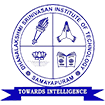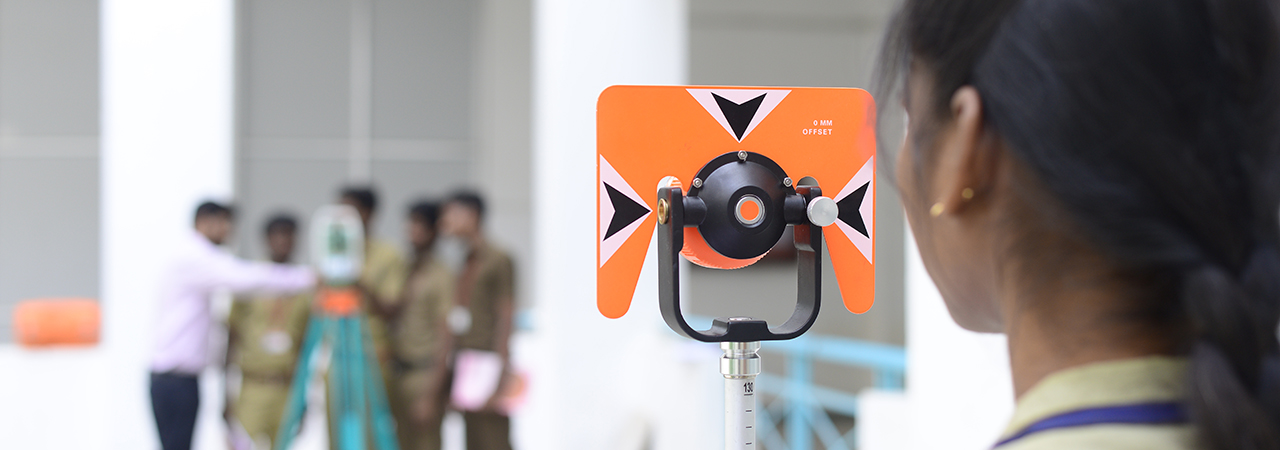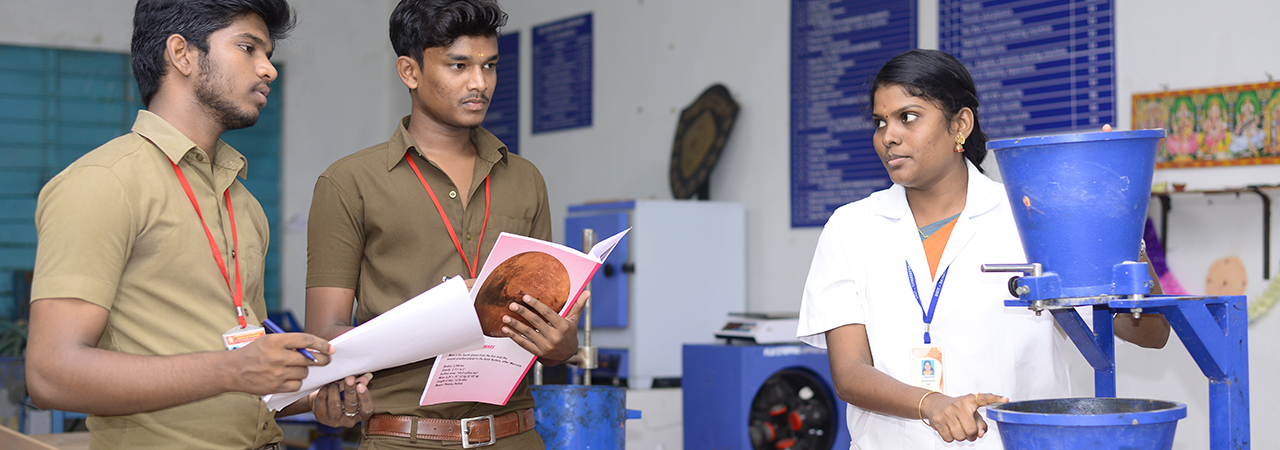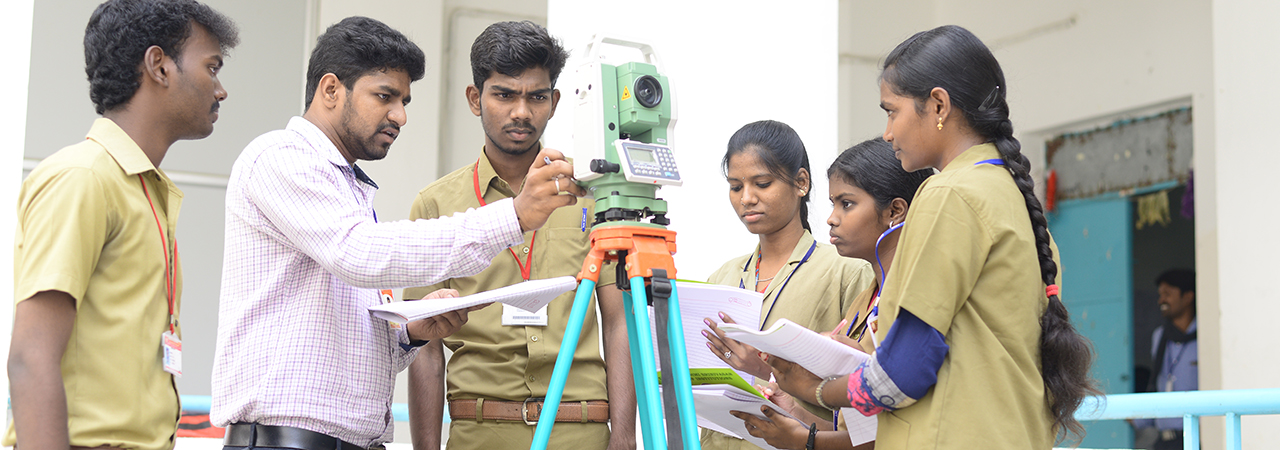About the Department
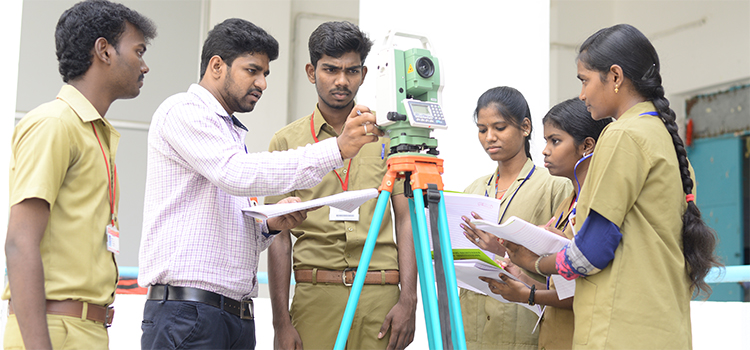
Civil Engineering is a professional engineering discipline and it is the mother branch of engineering that deals with planning, design, construction and maintenance of the physical and naturally built environment, including works such as buildings, roads, dams, runway, harbour, towers, bridges etc. Civil engineering is the oldest engineering discipline after military engineering, and it was defined to distinguish non-military engineering from military engineering. The department provides a teaching learning environment through which students learn the art of development and sustainability.
It is traditionally broken into several sub-disciplines including Surveying, Environmental Engineering, Geotechnical Engineering, Structural Engineering, Transportation Engineering, Water Resources Engineering, Construction Engineering, Mining Engineering and Coastal Engineering.
Courses
Dhanalakshmi Srinivasan Institute of Technology is affiliated to Anna University Chennai. Department of Civil Engineering follows the courses and subjects prescribed by Anna University which provides in-depth studies in the following main stream subjects.
- Surveying
- Construction Techniques Equipment and Practices
- Fluid mechanics
- Mechanics of Solids
- Engineering Geology
- Strength of materials
- Highway Engineering
- Applied Hydraulic Engineering
- Soil mechanics
- Foundation Engineering
- Structural Analysis
- Railway Engineering
- Design of Steel Structures
- Construction planning and scheduling
- Irrigation Engineering
- Hydrology
- Estimation and Quantity Surveying
- Dynamics and Aseismic Design
- Reinforced Concrete Brick Masonry Structure
- Pre stressed Concrete Design
- Principles of Management.
- Environmental Engineering
- Municipal Solid Waste Management
- Prefabricated Structures
- Repair and Rehabilitation of Structures
- Management of Irrigation system
- Engineering Economics and Cost Analysis
Guest lectures
Guest lectures on latest advance topic and upcoming fields are conducted by experts from research and industries organizations.
Student development programs
- Auto CADD
- STAAD Pro
- Personal Development Training
- Aptitude Test, Group Discussion,
- General Ability Training Programs
Programme Educational Objectives (PEOs)
- PEO 1: To prepare students for successful careers in Civil Engineering field that meets the needs of Indian and multinational companies.
- PEO 2: To develop the confidence and ability among students to synthesize data and technical concepts and thereby apply it in real world problems.
- PEO 3: To develop students to use modern techniques, skill and mathematical engineering tools for solving problems in Civil Engineering.
- PEO 4: To provide students with a sound foundation in mathematical, scientific and engineering fundamentals necessary to formulate, solve and analyze engineering problems and toprepare them for graduate studies.
- PEO 5: To promote students to work collaboratively on multi-disciplinary projects and make themengage in life-long learning process throughout their professional life.
Programme Outcome (POs)
- PO1: Engineering Knowledge: Strong foundation in core Computer Science and Engineering, both theoretical and applied concepts
- PO2: Problem Analysis: Identify, Formulate, Ability to apply knowledge of mathematics, science and engineering to real-life problem solving and reaching validated conclusions related to computer science.
- PO3: Design/Development of solutions: Ability to analyze, design, model, and develop complex software and information management systems that meet the specified needs with appropriate consideration for the public health and Safety and the cultural societal and environmental considerations.
- PO4: Conduct Investigations of Complex problems: Ability to use research– based knowledge and study methods including analysis, design, coding implementation, testing and interpretation of data, to provide valid Conclusions.
- PO5: Modern Tool Usage: Convention of recent techniques, modern engineering and IT tools with an understanding of the limitations.
- PO6: The Engineer and Society: Apply Reasoning informed by the contextual knowledge to assess societal, health, safety, legal and cultural issues and the consequent responsibilities relevant to the Computer Science and engineering Practice.
- PO7: Environment and Sustainability: Understanding the impact of Computer Science and Engineering solutions in the societal and human context.
- PO8: Ethics: Understand and apply professional ethical responsibility
- PO9: Individual and Team Work: Ability to function effectively within teams in Software projects.
- PO10: Communication: Ability to communicate effectively, both in writing and oral makes effective presentations to provide and obtain clear instructions.
- PO11: Project Management and Finance: Demonstrate knowledge and understanding of the engineering management principles and apply these to one’s own work, as a member and leader in a team, to manage projects and in multi-disciplinary environments.
- PO12: Life-Long Learning: Recognize the need for and have the preparation and ability to engage in independent and life-long learning.
Programme Specific Outcome (PSO)
- PSO1: To Survey The Lands And City Places For Laying Of Roadway&Railway For The End to End Of Every District & Status.
- PSO2: To Construct A Building Projects With Earthquake Resistance & Damp Proof.
- PSO3: To Educate about the Destroying of Building Due To Disaster’s.
